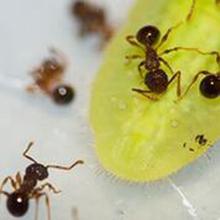
The ants become aggressive in response to the elongated projections (spotted patterns) of the larvae. Project Assistant Professor HOJO Masaru of Kobe University, Graduate School of Science, and joint research groups at the University of the Ryukyus and Harvard University have discovered that lycaenid butterfly larvae, which are in a symbiotic relationship with ants, can control the effect of dopamine by supplying the ants with nectar. The results of this study provide novel insight into the phenomenon of symbiosis and give clues about the physiological functions of dopamine. The study was published in Current Biology on July 31.
Lycaenid butterflies and ants are representative examples of mutualism, in which different species benefit from the activities of the other. The larvae of lycaenid butterflies secrete a nectar rich in sugars and amino acids, thereby supplying ants with a source of nutrition, whereas the ants in turn protect the larvae from their natural enemies. However, these benefits are not necessarily balanced because the ants can find alternative sources of food, whereas the larvae are completely dependent on the ants for protection.
Therefore, Project Assistant Professor HOJO and his research group hypothesized that the larvae possessed some mechanism to keep the ants from leaving. Using Narathura japonica and Pristomyrmex punctatus, the group investigated the behavior of the two species under the following three conditions:
- An ant-only environment
- A symbiotic environment with larvae and ants (with nectar)
- A symbiotic environment with larvae and ants (no nectar)
A reduction in locomotor activity was observed only in ants that ingested nectar, making them stay around the larvae longer. In addition, the researchers discovered that these ants were more aggressive.
Measuring brain chemicals in ants that ingested the nectar revealed a decrease in the levels of dopamine, which modulates various behaviors in animals. Moreover, a similar reduction in movement activity was observed in ants administered a drug that suppresses dopamine release (reserpine).
This study suggests that the mutualistic relationship between lycaenid butterfly larvae and ants is maintained through the selfish manipulation of behavior by the larvae.
Project Assistant Professor HOJO says, "We would like to further study the benefits to the ants of taking the nectar from the larvae."
Source: Kobe University
 Print Article
Print Article Mail to a Friend
Mail to a Friend
